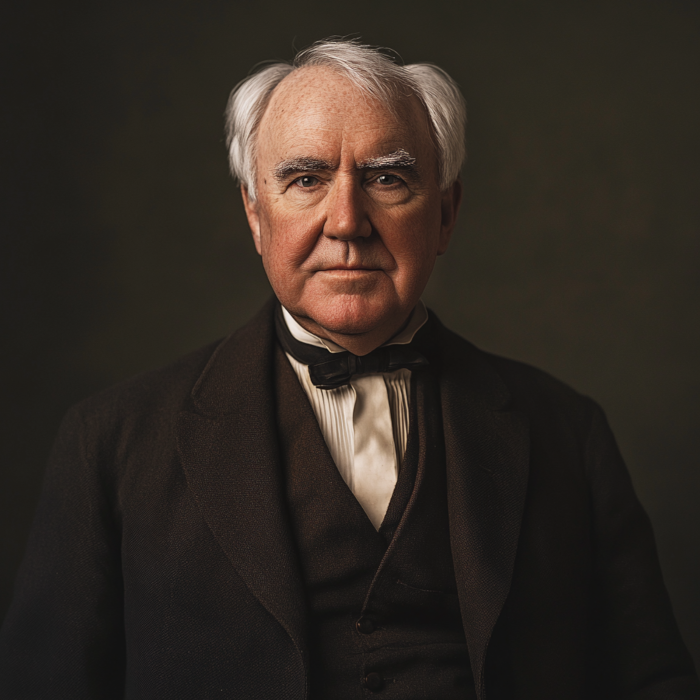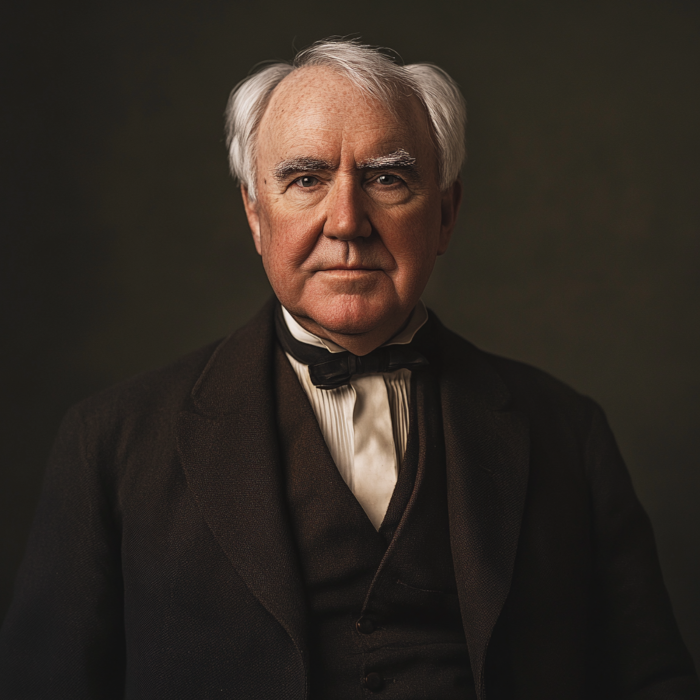


Thomas Edison (1847–1931) was an American inventor, businessman, and one of the most prolific inventors in history. He is best known for his contributions to the development of the electric light bulb, the phonograph, and the motion picture camera. Edison's work had a profound impact on modern life, earning him the nickname "The Wizard of Menlo Park." His innovations and the businesses he built around them laid the foundation for many aspects of the modern industrial world.
Telegraphy: Edison's early career was shaped by his work as a telegraph operator. He began working as a telegraphist at the age of 15, after saving a three-year-old boy from a train accident. The boy’s grateful father, a telegraph operator, trained Edison in telegraphy. This job took Edison to various cities across the United States and provided him with valuable technical skills. It was during this time that he began experimenting with improvements to telegraphic equipment, leading to his first inventions.
First Patents: Edison's first patent, granted in 1869, was for an electric vote recorder. Although the invention was not a commercial success, it marked the beginning of his career as an inventor. He moved to New York City in 1869, where he worked on improving stock tickers, telegraphs, and other electrical devices. His improvements to the stock ticker earned him significant financial rewards and allowed him to set up his first small laboratory and manufacturing facility in Newark, New Jersey.
Menlo Park Laboratory: In 1876, Edison moved to Menlo Park, New Jersey, where he established the first industrial research laboratory. Menlo Park became known as the birthplace of many of Edison's most important inventions. It was here that Edison assembled a team of engineers and technicians who worked together on various projects. This collaborative approach to invention was revolutionary and became a model for future research and development labs.
The Phonograph (1877): One of Edison's most famous inventions was the phonograph, which he developed in 1877. The phonograph was the first device capable of recording and reproducing sound. It was an instant sensation and earned Edison widespread acclaim as a brilliant inventor. The phonograph had a lasting impact on the music industry and the way people experienced sound.
The Electric Light Bulb (1879): Perhaps Edison's most significant invention was the practical incandescent light bulb. While he did not invent the first electric light, he developed the first commercially viable and long-lasting incandescent bulb in 1879. Edison's breakthrough involved using a carbon filament, which made the bulb durable and efficient enough for widespread use. This invention revolutionized the way people lived and worked, extending productive hours beyond daylight and contributing to the spread of electricity.
The Electric Power System: To support the widespread adoption of electric lighting, Edison developed an entire system for generating and distributing electricity. In 1882, he opened the first commercial power station on Pearl Street in New York City, which provided electricity to parts of Manhattan. This system marked the beginning of the electrification of cities around the world.
The Motion Picture Camera (1891): Edison's interest in motion pictures led to the invention of the Kinetoscope, an early motion picture exhibition device, in 1891. Working with his assistant William Kennedy Laurie Dickson, Edison developed the first motion picture camera, known as the Kinetograph, and the first film studio, dubbed the "Black Maria." These innovations laid the groundwork for the film industry.
General Electric and Business Expansion: Edison founded several companies during his career, the most notable being Edison General Electric, which later became General Electric (GE). GE is one of the largest and most diversified industrial corporations in the world. Edison's business ventures extended beyond electrical systems to include the manufacture of batteries, cement, and other products.
The Storage Battery: Another important invention was the alkaline storage battery, which Edison developed in the early 1900s. This battery was used in various applications, including powering electric vehicles and providing energy storage for the military. Edison's work on batteries contributed to the development of portable power sources that are still in use today.
Personal Life: Edison was married twice and had six children. His first wife, Mary Stilwell, whom he married in 1871, died in 1884. He later married Mina Miller in 1886. Edison was known for his relentless work ethic, often working long hours and sleeping only a few hours a night. Despite his hearing impairment, which began in childhood, he remained highly productive throughout his life.
Death: Thomas Edison died on October 18, 1931, at the age of 84, in West Orange, New Jersey. His death was widely mourned, and his contributions to science, technology, and industry were celebrated around the world.
Prolific Inventor: Thomas Edison held 1,093 U.S. patents, as well as many patents in other countries, making him one of the most prolific inventors in history. His inventions spanned a wide range of fields, including electrical power, sound recording, motion pictures, and telecommunications. Edison's ability to combine creativity, scientific knowledge, and business acumen made him a pivotal figure in the development of modern technology.
Cultural Icon: Edison became a symbol of American ingenuity and innovation. His story, from humble beginnings to global success, embodied the ideals of hard work, perseverance, and the pursuit of knowledge. He was often portrayed in the media as the quintessential inventor, and his life inspired countless future scientists, engineers, and entrepreneurs.
Influence on Industry: Edison's approach to invention, which involved systematic research, experimentation, and collaboration, set the stage for modern research and development practices. His creation of the Menlo Park laboratory is often considered the prototype for the modern R&D lab, where teams of scientists and engineers work together to develop new technologies.
Enduring Impact: The technologies that Edison developed and the industries he helped to create continue to shape the world today. Electric lighting, recorded sound, motion pictures, and electric power distribution are all integral parts of modern life, and Edison's contributions to these fields remain foundational.
Thomas Edison was more than just an inventor; he was a visionary who transformed the way we live through his relentless pursuit of innovation. His contributions to science, technology, and industry laid the groundwork for the modern world, and his legacy as a pioneer of invention continues to inspire generations. Edison's work ethic, creativity, and ability to turn ideas into practical, life-changing technologies have earned him a permanent place in history as one of the greatest inventors of all time.

We use cookies
We use cookies and other tracking technologies to improve your browsing experience on our website, to show you personalized content and targeted ads, to analyze our website traffic, and to understand where our visitors are coming from. Privacy Policy.